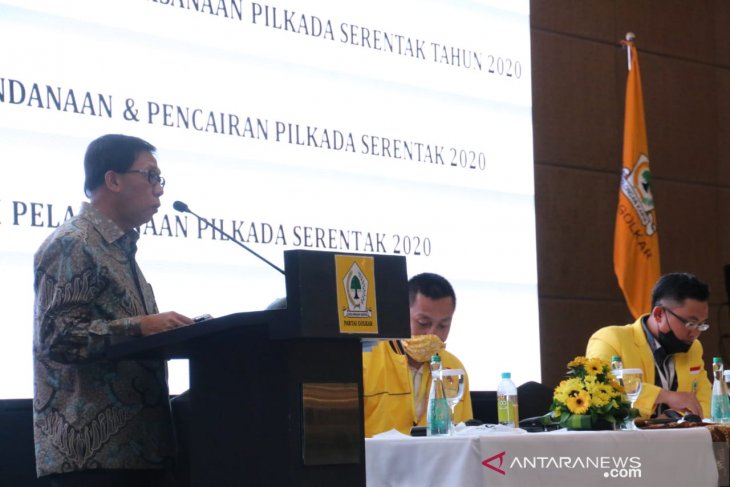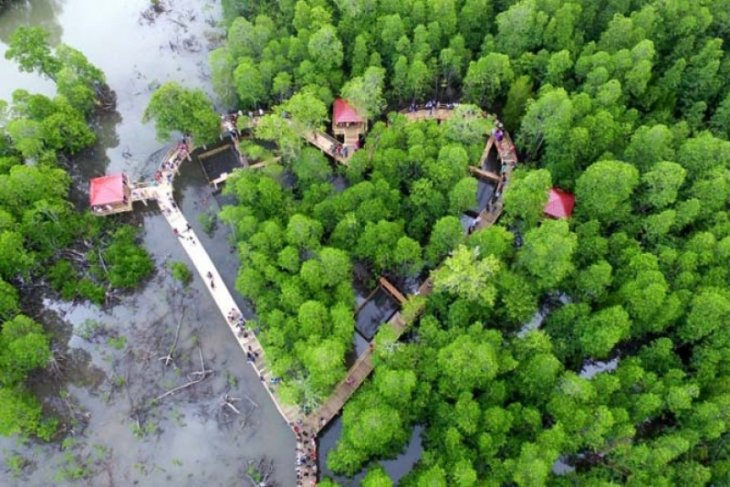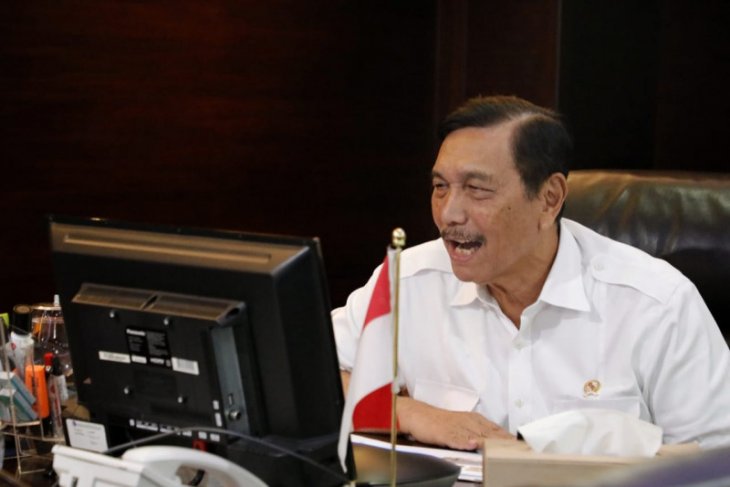Live Streaming
Program Highlight
Company Profile

Ani Hasanah
July

acting Secretary General of the Ministry of Home Affairs Muhammad Hudori
Successful regional head elections (Pilkada) to be organized simultaneously in 270 regions in Indonesia's 32 provinces are part of the national agenda, according to acting Secretary-General of the Ministry of Home Affairs Muhammad Hudori.
"The 2020 simultaneous local elections will be organized in 270 regions in 32 provinces, except Aceh and Jakarta. Pilkada is a national agenda or a national strategic program, and it must be implemented successfully," Hudori said in a statement in Jakarta on Sunday.
The simultaneous local elections must be carried out democratically as mandated by Indonesia's democratic system, he remarked.
He highlighted the importance of applying strict health protocols as the Pilkada will be held amid the ongoing COVID-19 pandemic.
"An important point that I want to convey is that the election implementation process must follow the health protocols and be guided by democratic principles," he added.
In early July 2020, Minister of Home Affairs Tito Karnavian expressed his hope that the voter turnout in simultaneous Pilkada this year would reach at least 50 percent.
"The target of voter turnout that we expect is above 50 percent. If possible higher than that, it will be better," Tito Karnavian said while speaking during an online seminar on July 5, 2020.
The minister hoped at least some 53 million people would cast their votes in the upcoming elections this year.
Based on June 9 data, the number of eligible voters in the 2020 local elections is 106,774,112 people, according to Arief Budiiman, chairman of the National Elections Commission (KPU).
The 2020 simultaneous regional head elections will be held on December 9 to elect governors in nine provinces, district heads in 224 districts, and mayors in 37 cities
The local elections were initially scheduled to be organized on September 23, 2020, but owing to the COVID-19 pandemic, it is decided to be postponed. (ANTARA)
July

An aerial view of a mangrove forest in Indonesia. (photo: ANTARA/HO-KKP)
The Ministry of Maritime Affairs and Fisheries (KKP) has set a target to rehabilitate 200 ha of mangrove forests in several coastal regions across Indonesia this year.
KKP planned to improve the condition of the mangrove ecosystem by planting mangrove trees in 200-hectare areas in 12 locations across the country in 2020, Aryo Hanggono, KKP's Director General of Marine Space Management (PRL), said in a statement in Jakarta on Sunday.
"One of the priority locations is in East Lampung with planned planting areas covering 40 hectares, namely in Margasari Village and Sriminosari Village," he noted.
The other locations are North Aceh, Belitung, West Pasaman, South Pesisir, Cirebon, Rembang, Sampang, Probolinggo, Lamongan, Menpawah, and Kupang.
Rehabilitation of mangrove plants is aimed to ward off abrasion and improve marine ecosystems.
In addition, the locations are also expected to become ecotourism areas that can provide alternative livelihoods for coastal communities.
Based on the 2020-2024 National Medium-Term Development Plan (RPJMN), the ministry has been mandated to carry out coastal rehabilitation efforts through mangrove tree planting in a total of 1,800 ha areas by 2024.
The ministry also plans to develop mangrove paths and learning centers for coastal ecosystem restoration in 10 districts and cities in 2021.
Meanwhile, Director of Coastal and Small Islands Utilization Muhammad Yusuf highlighted that mangrove forests could store abundant blue carbon reserves, in addition to their main function as a coastal buffer system from abrasion due to waves and rising sea levels.
"Indonesia is home to 23 percent of the world's mangroves. Mangroves play an important role as a global carbon controller and an important ecosystem controlling marine ecosystems," he said.
Based on the ministry's data, mangrove forests in Indonesia cover 3.49 million hectares totally, but 52 percent or 1.82 million hectares of them are in damaged condition.
He called on the community to protect mangroves, to use the mangrove ecosystem in a wise manner, and to maintain its sustainability because the mangrove ecosystem is very vulnerable and the ecosystem is limited. (ANTARA)
Indonesian Embassy in Panama City Again Facilitates Repatriation of 39 Indonesian Ship Crew Members
Jakarta (VOI News) - The Indonesian Embassy in Panama City in collaboration with Gilontas Ocean Panama, a Taiwanese-owned shipping company has successfully repatriated 39 Indonesian ship crew members working on fishing vessels, from Panama City to Indonesia by a humanitarian aircraft. Rheinhard Sinaga, Protocol and Consular Functions at the Indonesian Embassy in Panama City in his statement to the Voice of Indonesia in Jakarta, Sunday (26/7) said that the repatriation of the Indonesian ship crew members this time was carried out in 3 phases, namely on July 7 with 9 crews, on July 14 with 12 crews and on July 21 with 18 crews.
Rheinhard Sinaga further said the Indonesian Embassy in Panama City intensively coordinated with various parties to help facilitate the repatriation of the Indonesian ship crew members.
"In this repatriation, the Indonesian Embassy in Panama City coordinated intensively with Gilontas Ocean Panama, the Ship Agents in Indonesia, and related authorities in Panama to help facilitate in terms of diplomatic affairs, related to permits disembarkation from the Ministry of Health and the Ministry of Foreign Affairs of Panama, the issuance of travel certificate for the Indonesian ship crew members and other related matters from the Government of Panama. The repatriation costs are entirely borne by the Gilontas Ocean Panama company," Reinhard Sinaga said.
Rheinhard Sinaga added, the Indonesian crew members used a humanitarian flight organized by KLM Flight from Panama to Amsterdam, the Netherlands, and continued with a commercial plane via Doha, Qatar, to Jakarta.
In his statement, Reinhard Sinaga said upon arrival in Jakarta, the Indonesian ship crew members undergo a health protocol set by the Indonesian Government to ensure that they are in a healthy condition and are not infected with the COVID-19 virus before continuing their journey to their respective regions. (VOI / AHM)
July

Coordinating Minister for Maritime Affairs and Investment
Indonesian Coordinating Minister for Maritime Affairs and Investment Luhut Binsar Pandjaitan (LBP) has said that the government has set a target of earning US$10 billion from iron and steel exports this year.
Although the value was relatively small, the amount would significantly help export performance, Pandjaitan said in Jakarta on Saturday.
He said the country's investment sector was badly affected by the COVID-19 impacts, however exports began to go up.
"(COVID-19) has hit demands, consumption and investment hard since the beginning of this year until at present," he said at an online LBP Afternoon event entitled "Investment in the Middle of the Pandemic".
During the COVID-19 pandemic, exports of iron and steel had grown higher than the exports of vehicles, according to him.
"In 2014, our raw material exports were valued at US$1.1 billion, while the value of car exports reached US$5.2 billion US dollars. In 2019, after we built the smelter, we exported iron and steel at the total value of US$7.4 billion, and car exports at US$8.1 billion," he said.
During the first quarter of this year, Indonesia exported iron and steel worth US$2.3 billion, he added.
Based on data as of July 25, 2020, the iron and steel exports reached US$4 billion, and vehicle exports were worth US$2.3 billion.
In the meantime, the Investment Coordinating Board (BKPM) registered a 4.3-percent decrease in the realization of investment during the second quarter (Q2) of 2020, reaching Rp191.9 trillion, from the Rp200.5-trillion investment during the corresponding period last year.
BKPM Head Bahlil Lahadalia stated on July 22 that investment during the April-June period had dropped 8.9-percent as compared to the investment of Rp210.7 trillion in the first quarter of the year.
"Our target is more than Rp200 trillion for the second quarter. However, we are all aware of the tough situation arising from the COVID-19 pandemic. The second-quarter period is quite tough," he noted.
The realization of foreign investment in the second quarter of 2020 reached Rp97.6 trillion, or 50.9 percent of the total investment, while domestic investment was recorded at 49.1 percent, or some Rp94.3 trillion. (ANTARA)


